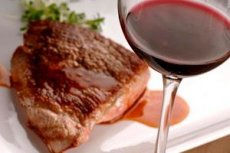Medical expert of the article
New publications
List of forbidden foods in gout
Last reviewed: 04.07.2025

All iLive content is medically reviewed or fact checked to ensure as much factual accuracy as possible.
We have strict sourcing guidelines and only link to reputable media sites, academic research institutions and, whenever possible, medically peer reviewed studies. Note that the numbers in parentheses ([1], [2], etc.) are clickable links to these studies.
If you feel that any of our content is inaccurate, out-of-date, or otherwise questionable, please select it and press Ctrl + Enter.

Gout is a common recurring disease that is accompanied by increased deposition of uric acid salts inside the joints and kidneys. During gout flare-ups, along with drug treatment, the patient will definitely be prescribed a diet, since certain changes in nutrition can have a key effect on the course of the disease. For example, if you exclude foods prohibited for gout from your diet, you can “transfer” the disease to a stable period of remission, as well as significantly alleviate its symptoms.
Even limiting the diet of undesirable products for gout will have a positive effect on the course of the disease. And if you completely exclude them, you can establish stable control over gout.
When creating a diet for a patient with gout, it is necessary to “remove” those foods that:
- promote the production and deposition of uric acid in the body;
- contribute to the disruption of metabolic processes.
The diet during an exacerbation of gout and during a decrease in symptoms is somewhat different. But the patient should not consume foods prohibited for gout throughout his or her life.
List of prohibited foods for gout
- Broths based on meat, offal, fish or mushrooms.
- Canned and pickled products.
- Sauces with the addition of hot pepper, garlic, vinegar.
- Fatty varieties of fish, fish roe.
- By-products (liver, kidneys, heart, lungs, etc.).
- Fatty types of meat.
- Salo.
- Sausages (dry, cooked sausage, hot dogs, frankfurters, etc.).
- Smoked products (lard, meat, cheese, fish, etc.).
- Hot spices (horseradish, mustard, wasabi, ketchup, chili pepper, etc.).
- Beans (beans, peas, lentils, peanuts).
- Salt in large quantities, as well as salty snacks, chips, crackers, salted fish (roach) and meat.
- Processed cheeses, feta cheese, suluguni, high-fat cheeses.
- Chocolate, Nutella, Nesquik, cocoa, strong teas and coffee.
- Flour products with butter cream.
- Sorrel leaves, rhubarb.
- Radish.
- Grapes and raspberries.
- Cauliflower.
In order to speed up the removal of uric acid salts from the body in gout, it is important to drink plenty of water:
- in the acute period – 2.5-3 l;
- during the period of symptom relief – 1.5-2 l.
Dehydration of the body should not be allowed with gout, just as prolonged dry fasting is unacceptable - this contributes to the massive accumulation of purines and uric acid salts in the tissues, which can provoke the development of an attack of the disease.
There are a number of other prohibitions for gout:
- Protein intake should be limited to 0.9 g per 1 kg of the patient's weight.
- Animal protein can make up no more than 70% of the total daily protein intake.
- Fish or meat can only be consumed boiled, since this is the only way to get rid of a certain portion of purines, which will “go” into the broth.
- The daily amount of salt is limited to 9 g.
- Drinking alcohol when you have gout is out of the question – it’s taboo. Even one glass of wine or another drink can cause a new gout flare-up.
- You can't starve yourself, just like you can't overeat.
Tomatoes, butter, fresh milk, honey, cream, sour cream - their consumption should be limited during periods of exacerbation of the disease.
Consumption of prohibited foods for gout is the main reason for frequent attacks and complications of the disease, and this is confirmed not only by health workers, but also by the patients themselves.
There is no need to worry about your diet: there are also quite a lot of foods that are allowed and even recommended for consumption with gout, and their list is very diverse.
Unfortunately, not all patients immediately exclude foods prohibited for gout from their daily menu - after all, the habit of eating this way is developed over the years, and it is very difficult to give up your usual diet at once. No problem: you can give up such prohibited foods gradually: first - fatty meat, lard, then - fatty fish, etc. If you act according to this scheme, the disease will stop steadily progressing.

